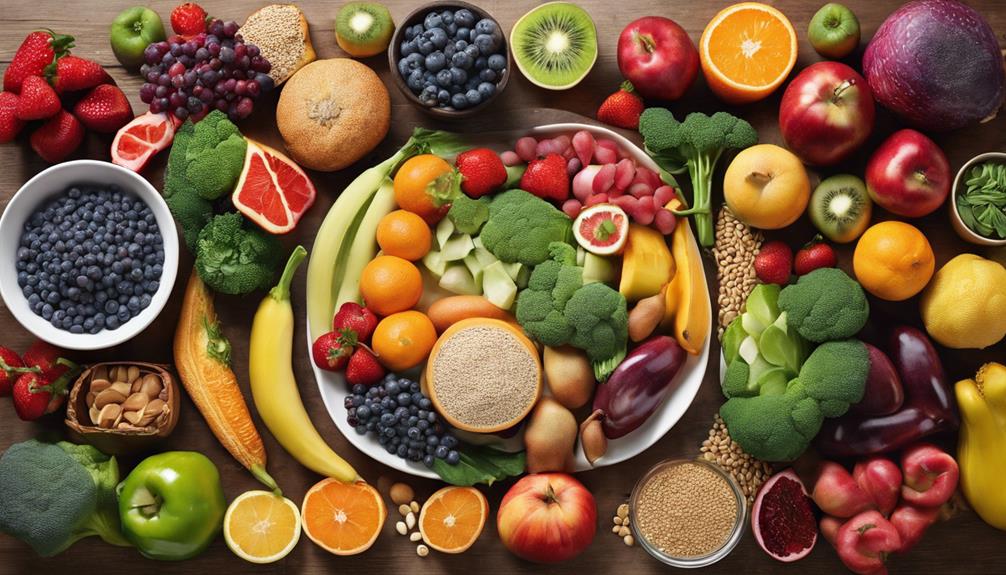As we begin the journey of discussing ten essential foods for a healthy breastfeeding diet, let us consider the nourishing power these items hold for both mother and child.
Each food on this list has been carefully selected to support the unique nutritional needs that come with breastfeeding, but there is more to uncover beyond just the basics.
By exploring the benefits and impact of incorporating these foods into your daily meals, we can discover how they can contribute not only to milk production but also to the overall well-being of both you and your little one.
Key Takeaways
- Leafy greens, lean proteins, whole grains, and healthy fats support overall health and milk production.
- Iron-rich foods combat fatigue and boost energy levels in breastfeeding mothers.
- Hydration with water, nutrient-dense snacks, and omega-3 sources are vital for milk supply.
- Superfoods and balanced meal components provide essential nutrients for brain development and well-being.
Leafy Greens
Including a variety of leafy greens in our diet is essential for breastfeeding mothers as they're rich in iron, calcium, and vitamin K, important for both maternal and infant health. Iron is necessary for replenishing the blood supply after childbirth and preventing fatigue. Calcium supports bone strength for both the mother and baby, while vitamin K aids in blood clotting.
Leafy greens like spinach and kale also provide folate, supporting cell growth and development in infants. Additionally, the fiber in these greens promotes healthy digestion, important for postpartum recovery. Phytonutrients and antioxidants found in leafy greens offer further health benefits, supporting the overall well-being of breastfeeding mothers.
Lean Proteins
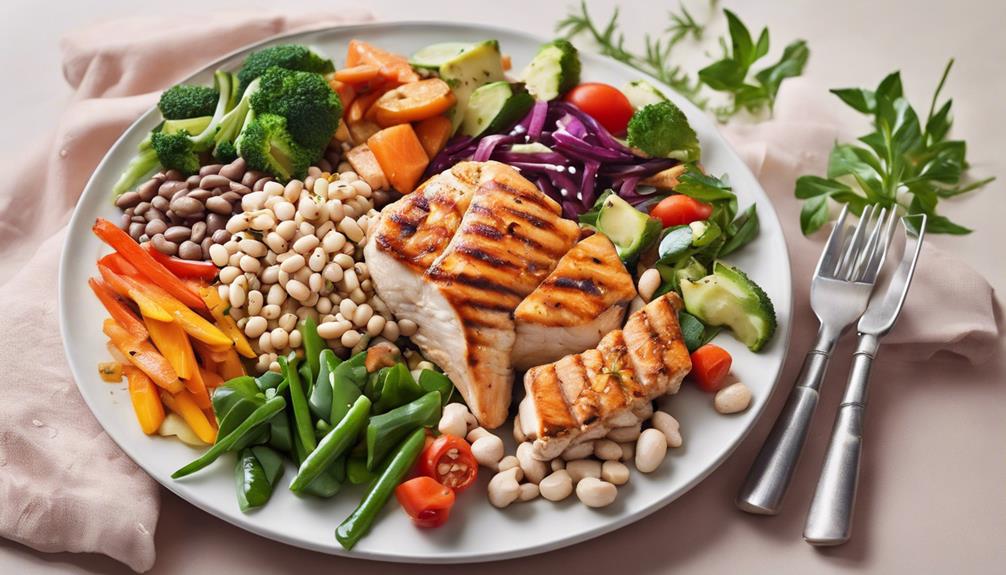
When it comes to nourishing our bodies during breastfeeding, lean proteins play an important role in supporting muscle maintenance and repair. These protein sources, such as chicken, fish, and tofu, offer essential amino acids necessary for postpartum recovery and sustaining energy levels.
Making mindful choices by incorporating a variety of lean proteins can contribute to overall health and well-being for both mother and baby.
Protein-Rich Breastfeeding Meals
Lean proteins, such as chicken, turkey, fish, lean beef, and eggs, play an important role in providing essential amino acids for tissue repair and growth during breastfeeding. Including plant-based sources like tofu, lentils, beans, and nuts can also help meet protein needs for breastfeeding mothers.
These protein-rich meals are essential for maintaining muscle mass, supporting immune function, and promoting overall health while breastfeeding. Ensuring a diverse intake of protein sources is key to obtaining a wide range of nutrients beneficial for both the mother and the baby.
Adequate protein intake is essential for the production of breast milk and the overall well-being of the breastfeeding mother and infant. Prioritizing lean proteins in your diet can contribute significantly to the quality of your breast milk and your overall health.
Benefits of Lean Proteins
Pivoting from the focus on protein-rich breastfeeding meals, the significance of incorporating lean proteins lies in their role in providing essential amino acids for tissue repair and growth during the breastfeeding period. Lean proteins like chicken, fish, lean beef, and tofu offer various benefits:
- These proteins are low in saturated fats, promoting heart health and aiding in weight management post-pregnancy.
- Lean protein sources are rich in iron, essential for preventing postpartum fatigue and supporting the baby's brain development.
- Including lean proteins in your diet can help maintain muscle mass and energy levels while breastfeeding, supporting overall health.
- Consuming adequate lean proteins can assist in the production of breast milk and make sure the mother's nutritional needs are met during this demanding period.
Whole Grains
Incorporating whole grains into your breastfeeding diet provides essential nutrients for postpartum recovery and sustained energy levels. Whole grains such as brown rice, oats, and whole wheat bread offer a rich source of fiber, B vitamins, iron, and magnesium important for your recovery and milk production.
These grains play an important role in regulating blood sugar levels, preventing energy dips, and supporting overall well-being. By choosing whole grains over refined options, you guarantee higher nutrient content, better satiety, and a balanced diet conducive to breastfeeding.
Additionally, including whole grains in your meals can aid in weight management and decrease the likelihood of chronic diseases like heart disease and diabetes. Embracing whole grains as part of your daily diet not only benefits you but also supports your baby's development through the nutrients passed on in breast milk.
Healthy Fats
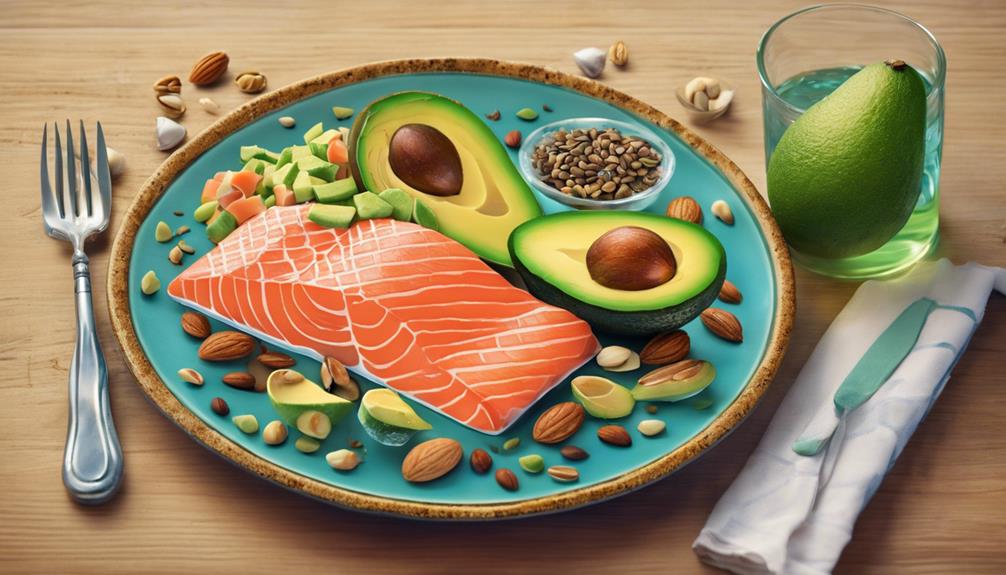
We all know the importance of omega-3 fatty acids in our diets, especially during breastfeeding. These healthy fats, found in various foods like fish, flaxseeds, and walnuts, play a critical role in brain development for breastfed infants.
Including sources of healthy fats such as avocados, olive oil, and chia seeds can further support hormone production and overall health during this critical period.
Importance of Omega-3
Omega-3 fatty acids, such as DHA and EPA, play a critical role in supporting brain development and eye health in infants. Maternal intake of these essential fats greatly impacts the levels available to the baby through breast milk.
Including fatty fish like salmon, sardines, and trout in your diet can boost omega-3 levels in breast milk. Plant-based sources such as flaxseeds, chia seeds, and walnuts are also beneficial for breastfeeding mothers.
In cases where dietary intake is insufficient, omega-3 supplementation may be recommended to make sure adequate levels for both mother and baby. Prioritizing these sources of omega-3 can contribute to the overall health and development of your breastfeeding infant.
Sources of Healthy Fats
When considering a balanced diet for breastfeeding, it's important to include a variety of sources of healthy fats that support brain development and overall health for both the mother and the baby. Omega-3 and omega-6 fatty acids are essential for ideal brain development in breastfeeding infants. Fatty fish such as salmon, mackerel, and sardines are excellent sources of these essential fatty acids.
Additionally, incorporating chia seeds, flaxseeds, and walnuts into your diet can provide the necessary healthy fats. Plant-based options like avocado, olive oil, and coconut oil are also beneficial for nursing mothers. These healthy fats help maintain hormonal balance and support your overall well-being during the breastfeeding journey.
Nuts, seeds, and natural nut butters are easy additions to meals and snacks that offer essential fatty acids for both you and your baby.
Calcium-Rich Foods
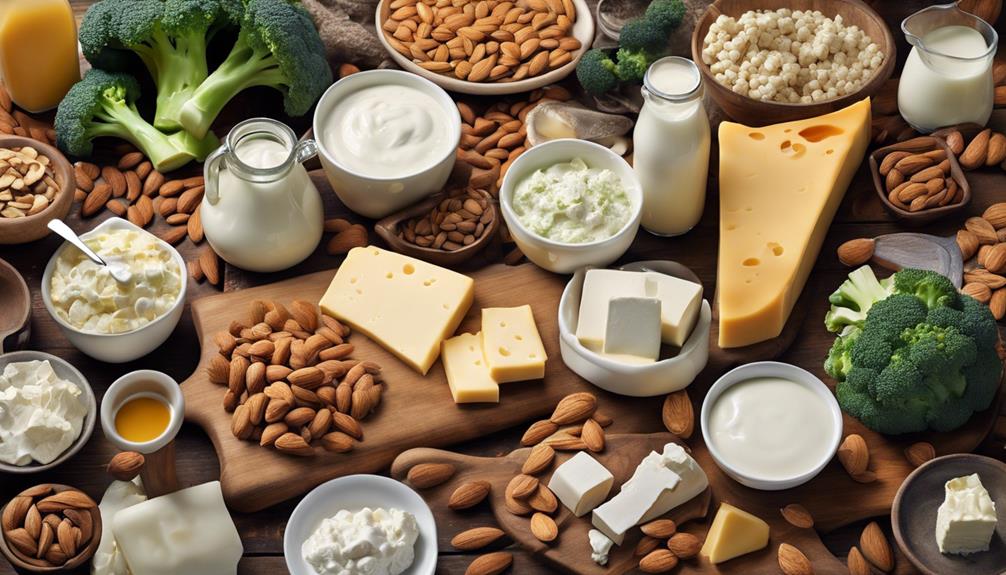
To support strong bones and teeth during breastfeeding, incorporating calcium-rich foods like dairy products, fortified plant-based milks, leafy greens, and almonds is essential. Adequate calcium intake is vital for breastfeeding mothers as they may experience bone density loss due to the demands of supporting their baby's bone development.
Meeting the recommended daily intake of around 1,000 mg of calcium can be achieved through sources such as yogurt, cheese, tofu, and calcium-fortified foods. Here are some key calcium-rich foods for breastfeeding moms:
- Yogurt
- Cheese
- Tofu
- Calcium-fortified foods
Including these items in your diet not only supports overall bone health but also helps meet the increased calcium requirements during the postpartum period. Low-fat dairy options like milk and yogurt are convenient choices that can be easily integrated into meals and snacks. Prioritizing these calcium-rich foods can benefit both you and your baby's health during the breastfeeding journey.
Iron-Rich Foods
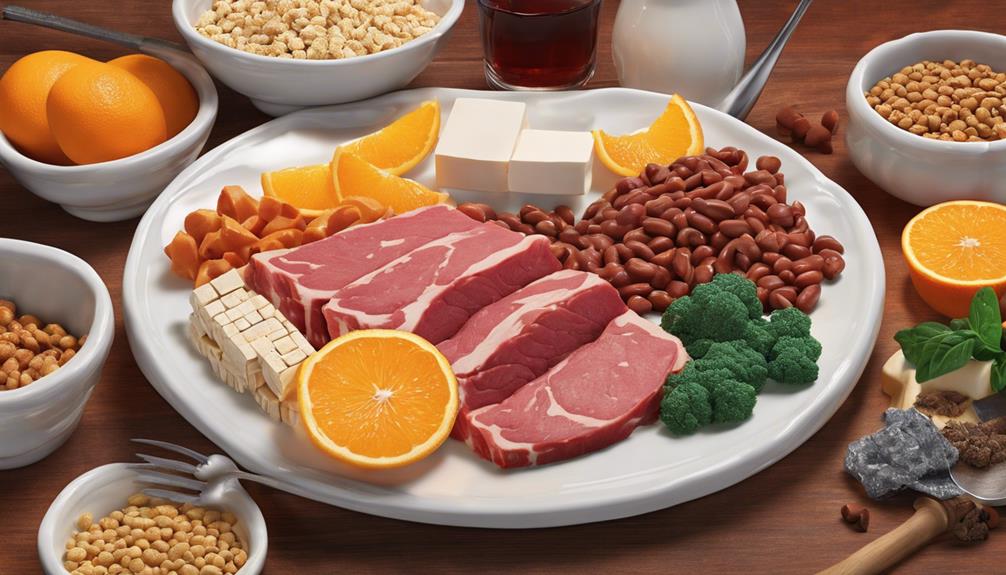
Supporting best energy levels and preventing fatigue during breastfeeding, iron-rich foods play an essential role in maintaining overall health for lactating mothers. Iron is essential for energy production, making lean meats, poultry, fish, lentils, beans, and fortified cereals important additions to a breastfeeding diet. The recommended daily intake of iron for breastfeeding mothers is 9-10 milligrams per day.
By consuming iron-rich foods, mothers can prevent anemia, a condition that can impact both their own health and that of their baby. To enhance iron absorption from plant-based sources like lentils and beans, incorporating vitamin C-rich foods such as citrus fruits is beneficial.
Ensuring an adequate intake of iron through a balanced diet is key to sustaining energy levels, combating fatigue, and supporting the overall well-being of breastfeeding mothers.
Hydration Sources

Adequate hydration is essential for breastfeeding mothers as it's important for maintaining milk supply and ensuring proper hydration for both the mother and baby.
When it comes to staying hydrated while breastfeeding, here are some key points to bear in mind:
- Water: The best choice for hydration, as breast milk is primarily composed of water.
- Unsweetened beverages: Opt for options like herbal teas, coconut water, or homemade fruit-infused water to stay hydrated without added sugars.
- Urine color: Monitoring urine color can help assess hydration levels, aiming for pale yellow urine as a sign of adequate hydration.
- Avoidance: Limit drinks with added sugars, caffeine, or alcohol to maintain overall health and prevent passing these substances to your baby through breast milk.
Nutrient-Dense Snacks
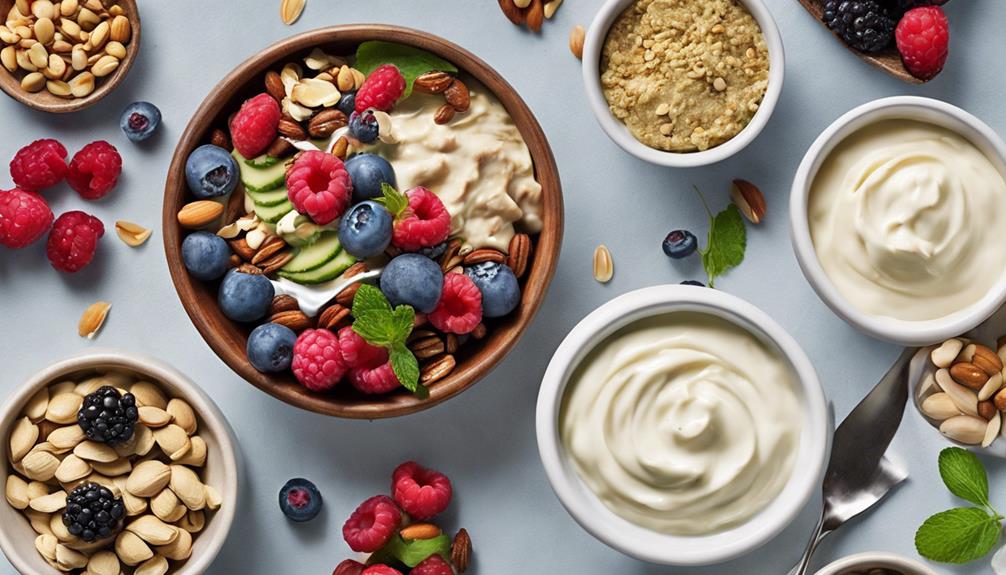
When aiming to snack healthily while breastfeeding, incorporating nutrient-dense options is essential for nourishing both the mother and the baby. Nutrient-dense snacks play a vital role in providing the energy and essential nutrients required during breastfeeding. Here are some wholesome snack options that can benefit both you and your baby:
| Foods | Benefits | Nutrients |
|---|---|---|
| Greek yogurt with berries | Provides protein and antioxidants for overall health | Healthy fats, protein, antioxidants |
| Almonds or walnuts | Supplies healthy fats, fiber, and protein for sustained energy | Healthy fats, fiber, protein |
| Hummus and vegetable sticks | Offers fiber, vitamins, and minerals for a satisfying snack | Fiber, vitamins, minerals |
| Hard-boiled eggs | Convenient source of high-quality protein and essential nutrients | High-quality protein, vitamins, minerals |
These options are rich in high-quality protein, healthy fats, fiber, vitamins, and minerals essential for the well-being of both you and your baby. Incorporating these nutrient-dense snacks into your diet can support your breastfeeding journey.
Superfoods for Breastfeeding
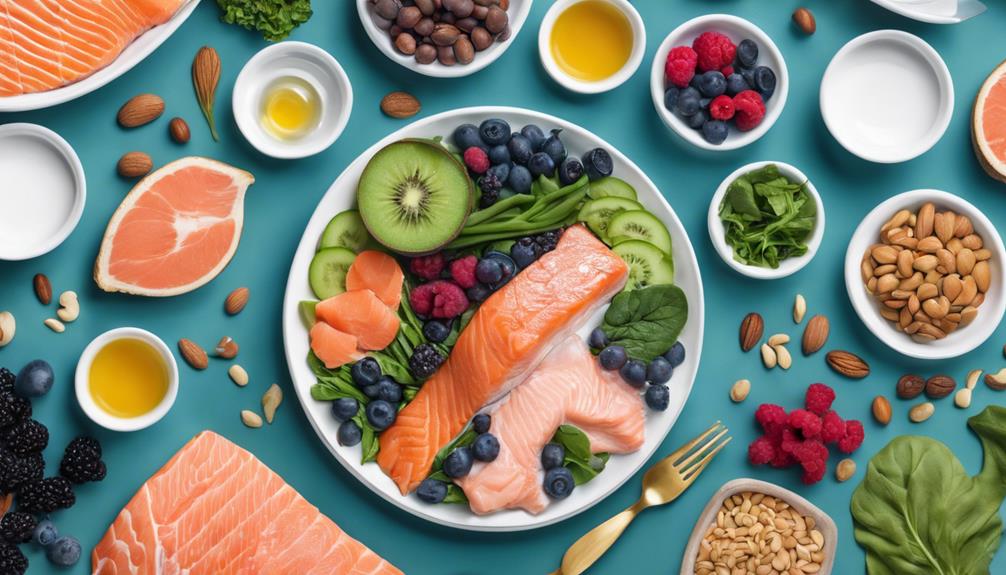
Incorporating superfoods into your diet while breastfeeding can provide essential nutrients for both you and your baby's health and development. Here are some superfoods that can benefit breastfeeding mothers:
- Chia seeds: Rich in omega-3 fatty acids important for baby's brain development.
- Greek yogurt: Packed with protein and calcium, essential for bone health and muscle function.
- Spinach: High in iron, important for preventing fatigue and maintaining energy levels.
- Oats: Known to boost milk supply due to their high fiber and iron content, benefiting breastfeeding moms.
Including these superfoods in your diet can help make sure you're getting the necessary nutrients like iron, protein, and calcium while also supporting your baby's brain development and milk supply.
Whether it's the DHA in salmon for brain health or the iron in spinach to combat fatigue, these superfoods can contribute to your overall well-being during the breastfeeding phase.
Balanced Meal Components
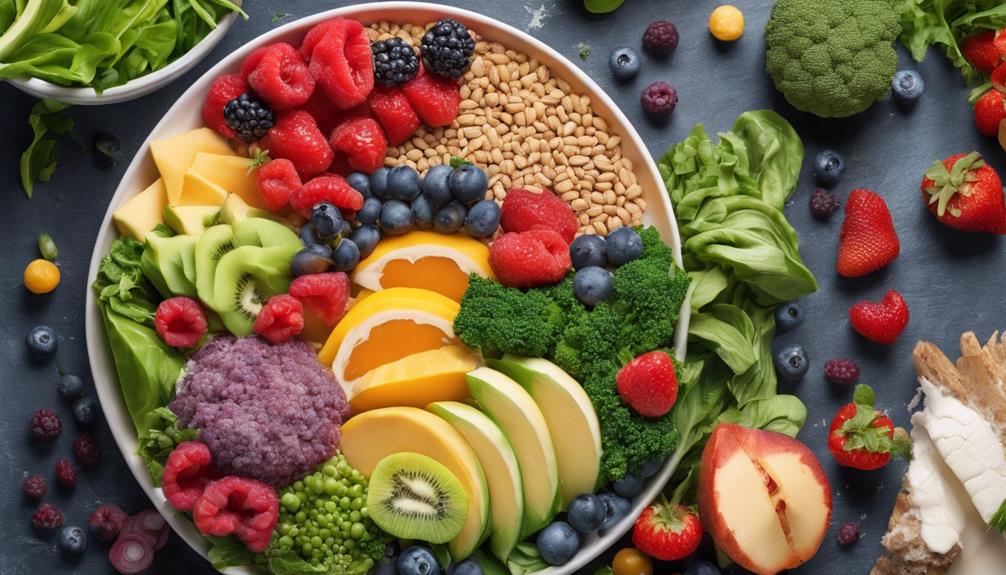
For a well-rounded breastfeeding diet, focus on incorporating lean protein sources, whole grains, colorful fruits and vegetables, healthy fats, and plenty of hydrating fluids. Lean protein sources like chicken, fish, beans, or tofu are essential for muscle repair and growth, aiding in the recovery process postpartum.
Whole grains such as brown rice, quinoa, or whole wheat bread provide the necessary fiber and energy to keep you feeling full and satisfied. Including a variety of colorful fruits and vegetables in your meals guarantees that you receive important vitamins, minerals, and antioxidants necessary for both your health and your baby's development.
Opt for healthy fats like avocado, nuts, seeds, or olive oil to support brain development in your little one and maintain hormone balance in your body. To stay hydrated, make sure to drink plenty of water and unsweetened beverages throughout the day. Proper hydration not only supports milk production but also contributes to your overall well-being during this important stage of motherhood.
Frequently Asked Questions
What Are the Healthiest Foods for Breastfeeding Moms?
We prioritize the healthiest foods for breastfeeding moms. Our picks include dark leafy greens for iron and calcium, salmon for omega-3s, Greek yogurt for protein, oatmeal for milk supply, and nuts for healthy fats.
What Must a Breastfeeding Mother Eat?
We should eat a variety of nutrient-dense foods rich in protein, vitamins, and minerals to support milk production and baby's growth. Lean proteins, whole grains, fruits, and vegetables are essential. Hydration is crucial; drink plenty of fluids while breastfeeding.
What Should I Eat More When Breastfeeding?
When breastfeeding, we should focus on a balanced diet rich in protein for tissue repair, fruits and veggies for vitamins, whole grains for energy, healthy fats for brain development, and staying hydrated for milk production.
What Are Healthy Meals to Increase Breast Milk?
We focus on nourishing foods that support breast milk production and overall health. Oatmeal, salmon, dark leafy greens, barley, and almonds are excellent choices due to their nutrients. They can boost milk supply, aid baby's development, and provide energy for breastfeeding moms.
Conclusion
As we wrap up our discussion on essential foods for a healthy breastfeeding diet, imagine a colorful plate filled with leafy greens, lean proteins, whole grains, and nutrient-dense snacks.
Picture yourself sipping on hydrating sources and enjoying calcium-rich foods to support your milk production.
By incorporating these foods into your daily meals, you aren't only nourishing yourself but also providing your baby with the best start in life.
Remember, a balanced and varied diet is key to best health for both you and your little one.
